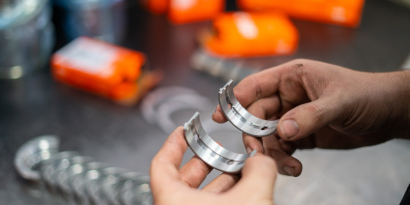Every car owner has likely faced this dreaded issue: “My car won’t start.” This situation can be frustrating and raise a series of questions: Why did this happen? What do I need to do? In this article, we’ll explain the top causes of this problem and provide practical troubleshooting tips to help you better understand your vehicle.
Car Won’t Start? Here Are the 5 Main Reasons
1. Dead Battery
The most common — and often overlooked — reason is a dead or weak battery. When the battery is low, your car may not make any sound when trying to start. Visible signs, such as dim headlights or dashboard lights that won’t turn on, indicate the battery may need to be recharged or replaced.
2. Faulty Starter Motor
Another possibility is a malfunctioning starter motor. When this happens, you may hear a strange noise or no noise at all when turning the key. Before diagnosing the starter, it’s important to rule out battery issues.
3. Fuel System Problems
A failing fuel pump may prevent the engine from receiving the necessary fuel. If the car shows no signs of starting and the battery and starter seem fine, the issue could be with the fuel pump.
4. Ignition System Issues
If your car won’t start, it could be due to problems with the spark plugs or ignition coils. A worn-out spark plug can lead to misfires, preventing the engine from starting properly. Regular maintenance of spark plugs is essential to avoid this.
5. Fuel Supply or Quality
One commonly forgotten issue is the fuel itself. An empty fuel tank or poor-quality gasoline can cause starting problems. Always make sure your fuel level is sufficient and you’re using fuel that meets your car’s specifications.
Troubleshooting Tips and How to Solve the Problem
Check the Battery
First, test the battery using a multimeter or take it to an auto parts store. Recharge or replace the battery if necessary.
Inspect the Starter Motor
Listen carefully when trying to start the engine. If you hear a clicking noise or something unusual, the starter motor might be the problem and may need professional repair.
Evaluate the Fuel System
When you turn the key, listen for the fuel pump’s humming sound. If there’s no sound, the fuel pump may need to be replaced.
Check the Spark Plugs
Remove and inspect the spark plugs. If they’re dirty or damaged, replace them to ensure proper engine performance.
Keep Your Vehicle Well-Maintained
Regular preventive maintenance helps avoid unexpected issues. Oil changes, filter replacements, and checking the electrical system are all essential.
Frequently Asked Questions
1. What should I do if my car battery is dead?
Try recharging it or using jumper cables to see if the car starts. If the problem continues, it’s best to replace the battery.
2. How long does a car battery last?
On average, a car battery lasts 3 to 5 years, depending on usage and maintenance.
3. Is it safe to keep trying to start the car?
Repeated attempts can damage the starter motor. It’s better to identify the cause before trying again.
4. When should I take my car to a mechanic?
If you can’t identify the problem quickly or hear strange noises when starting, consult a professional mechanic.
Preventive Maintenance Is the Key!
Dealing with a car that won’t start can be stressful, but with regular attention and preventive maintenance, many issues can be avoided.
And to ensure your vehicle always performs at its best, count on high-quality automotive parts.
RIO offers a wide range of automotive components to keep your car running smoothly. Get in touch and explore our full catalog to ensure your vehicle is always in top shape!





